- Home
- James Axler
Playfair's Axiom Page 2
Playfair's Axiom Read online
Page 2
Once they got clear of the rubble they could at least move faster and with less chance of turning an ankle in some hidden pocket of debris. They might even stand a chance of finding shelter against the likely coming of corrosive rains.
If they got clear. These scrubby, stinking ambushers didn’t seem inclined to let them do so.
Attackers sprang at Jak from either side even as he spun to face a third, whipping out a hunting knife. Ryan snapped a shot first at the right-hand assailant, then the one to his left. The right-hand ambusher went down. The one on the left, though, only went briefly to a bare bony knee. Then she stood up and with a screech attacked again, something slim and glittering jutting from the bottom of the fist she held over her head.
And the slide of Ryan’s SIG had locked back. Its high-capacity magazine was empty. He’d had to fire too many shots to keep attackers’ heads down. And now he had no time for a combat reload. Nor could he risk fumbling a magazine full of precious 9 mm cartridges away by trying to reload on the run.
Instead he whipped the panga free of its sheath with his left hand. He screamed like an eagle to attract the ambushers’ attention away from the slim white-haired teen.
The woman he’d shot looked his way, then she lunged for him. He saw that she held a simple sliver of broken glass with some kind of hide wrapped around one end to keep it from slicing her hand. It was primitive even by the standards of postdark improvised weapons, and liable to break on any kind of contact with a target. But it could kill you just as dead as a megaton nuke warhead.
Or just wound you badly enough to slow you down, which in an ambush like this was the same thing.
They both swung at the same time. Despite her wound, the woman had triple-crazy speed. But Ryan’s backhand cut was panther-fast and as precise as a needle. The panga hit the inside of the woman’s knife arm just beneath her wrist. Backed by the weapon’s considerable mass, the edge, which Ryan kept honed to razor keenness, parted tendon and bone almost as easily as skin. The hand spun away on a geyser of red, still clutching the crude glass shank.
Odds were she was out of this fight. Out of this life, if she didn’t get her arm bound before her adrenaline-frenzied heart pumped her lifeblood out the stump. Ryan hacked her across her twisted screaming face on the forearm return anyway. He couldn’t leave his own knife-arm swinging in the breeze. And he had learned as a mere stripling when he was running with trader’s crew that it never hurt to make sure.
Jak straightened from the body of the ambusher he’d just gutted with his big-bellied Bowie. “Clear,” he shouted as Ryan came up beside him. “Move!”
“Go!” Ryan said. He tracked his good eye left and right and saw no more figures emerging from the rubble. As Jak sprinted forward, the bits of sharp glass and metal he’d sewn to his camo jacket flashed in the sunlight.
Krysty came through the gap. Flashing an “I’m okay” smile at Ryan, she knelt to cover to the right. A moment later Mildred appeared, all but towing the scarecrow figure of Doc like a sturdy little tugboat. She let go and took up position to cover left.
Ryan reloaded the SIG handblaster, stuffing the empty magazine in a back pocket of his jeans. The mags were nearly as precious as cartridges. Without them a semiauto blaster was a single-shot weapon as slow and clumsy to reload as a crossbow.
With a parting boom of his shotgun J.B. passed through the gap as Ryan momentarily transferred the SIG to his left hand so he could properly sheath the panga with his right.
“Don’t hang around gawking, boy!” the Armorer shouted as he jacked the slide and turned to run. “This ain’t a vacation resort!”
Laughing a silent wolf’s laugh, Ryan took his SIG in his right hand and followed his companions at a slogging run.
Chapter Two
“One thing you gotta say for a ruined city,” J. B. Dix said. He had his hat lifted to mop his forehead with a dirty blue handkerchief. No sooner had he made a pass than more sweat sluiced down his sallow skin. “’Specially here hard by a big river. It sure does hold the heat in.”
“Wow,” Mildred said. Her words came out between heaving breaths. “Looks like Busch Stadium mostly survived.”
Without much interest Ryan looked at the stubby cylinder the freezie physician had pointed out. Several hundred yards to the west, it looked to be made up of tall, open arches supported by columns, and ramps that ran up behind them. He had unslung his longblaster and hunkered down, cradling it, hoping that if the hairy naked crazies chose to keep pursuing he’d get some shots into them at long range.
“Went to a game there once,” the stocky physician said. “Cards versus Cubs.”
She smiled with fleeting nostalgia. “That was a rivalry.”
“We don’t want to get too close to that thing,” J.B. said. “Who knows what’s nesting in there now?”
“Speaking of nesting,” Krysty said, “there seem to be a lot of flying things starting to swarm around the top of that really tall building.”
Jak turned his ruby eyes that way. It was easy to see which one she meant. It was easily the tallest standing as far as the eye could see. And Ryan saw twenty or more flyers orbiting high up.
“Screamwings,” he said.
“Never saw them big as that one before,” Ryan said. The giant flyer now orbited the tall ’scraper with the lesser ones surrounding it.
The albino youth just shrugged.
“Yeah,” Ryan said after a moment. “Don’t mean much, right? Always coming across something new.”
“Doesn’t mean much.” Krysty smiled as she corrected him.
“That’s what sucks about the modern world,” Mildred said, tipping a canteen to shake the last droplets of water into her mouth. “Well, part of a long, long list.”
They huddled in a bowl-shaped depression in yellowish-
gray rubble about forty feet wide and high enough at the sides to shield them from view from street level. Despite being in excellent shape from the never-ending trudge across the devastation wrought by the big nuke, all six were winded by their run. Except Jak; little seemed to bother him.
With little to weigh them down but grubby skins and a few crude weapons, their ambushers had chased them fast and hard. But they hadn’t chased them far.
“They gave up pretty quick,” Ryan said, squinting around at their surroundings, taking in the huge matched stumps of gleaming metal Mildred told him had once joined in an arch hundreds of feet above; the nearby huge building that once had to have been fronted entirely in glass was now a strange open-faced steel skeleton; the strip of dense east-west woods they had crossed to get here; the flooded waterfront district just east of them with ware-houses sticking up out of green-brown water; the intact section of highway overpass to the south.
“We inflicted grievous hurt on them,” Doc said. He was laboriously reloading his huge old handblaster, tamping down a bullet into a chamber over a fresh charge of gunpowder with a special rammer built into the LeMat. He was recovering with surprising quickness, given that he looked like Death got up for a last walk around. Times like these proved his claim that he was nowhere as old as he looked, biologically. “It must have been quite discouraging.”
“There’s that,” Krysty said. “But mebbe they were afraid of what was in the woods. Or this side of them.”
Ryan grunted. “Give us some good news for a change, why don’t you?”
Her smile was like the sun coming out from behind storm clouds. “We’re alive, lover. And we’ve got each other. It’s worked so far.”
He felt his mouth struggling to smile. He still had to say, “Always works. Till it don’t.”
“‘Doesn’t,’” she corrected him.
She had a temper on her, this redheaded beauty. But her mutie hair, sentient and prehensile, lay still across her shoulders. She just smiled more at him and wouldn’t be drawn.
“Nothing here but misery,” J.B. stated simply. “Why don’t we go back?”
“Back where?” Ryan asked.
“To the redoubt.”
“Not remember?” Jak said. “Nothing there, either. No ammo, no water, no self-heats.”
Mildred mopped her forehead with the hem of her shirt. “Never thought I’d see a day when meals refused by Ethiopians tasted like ambrosia.”
“I mean, try the luck of the jump,” J.B. said.
“If we find a place with steak bushes and beer springs,” Ryan said, “it’ll be guarded by ten thousand coldhearts, sure as a dead man cools.”
J.B. gestured around at the jumbled edges and angles and dust-softened mounds of the urban deathscape. “Don’t know if you noticed, Ryan, but every square inch of this place is guarded by muties as crazy as nuked yellowjackets, and it ain’t nothing but hammered dogshit.”
“Boys,” Krysty said softly but firmly, “step back. Fighting among ourselves won’t fill our bottles or our bellies. Makes us more likely to fill cannie bellies instead.”
“At times like this,” Doc said with a grand sweep of his arm, “I find it helps to seek the consolations of philosophy.”
Everyone looked at him. He sat blinking vaguely.
“Why are you all staring at me?” he asked.
“Well,” J.B. said, “out with it.”
“Out with what?”
“The consultations of philosophy or whatever you were talking about.”
Doc blinked in amiable puzzlement. “What?”
For his part Ryan was taking note of how unusually talkative the Armorer was. Normally J.B. said just a little more than an old hickory stump, although when he spoke it was usually to the point and dead-on accurate.
“What’s eating on you, J.B.?” he asked. “You don’t normally say so much in a whole month.”
J.B. slapped his thigh. “Everything, Ryan. I just got bad feelings creeping up on me from every side.”
Mildred frowned. “You wouldn’t think there’d be many people here. The place is a mess, even for taking a nuke west of here.”
“Plenty to scavenge in the area,” Ryan said.
“Those people who jumped us didn’t look like they’d bothered much with that. They barely had loincloths.”
“I surmise they were cannibals,” Doc said, sighting along the barrel of his blaster to make sure the bore was clear before snapping the weapon closed. “When we parted company with them, the other side of these woods, I thought I saw them begin tearing at their fallen kin.”
“Yeah,” Ryan said. “Chasing us probably worked up a double-big appetite.”
“Muties,” Jak said.
“No,” Mildred said, shaking her head. “I don’t think so.”
“Not see? No chins, plus fingers.”
“Typical symptoms of inbreeding, lad,” Doc said.
“Yeah,” Ryan agreed. He’d seen it not far from his birthplace of Front Royal.
“They have to have something to eat besides each other,” Mildred said.
“They probably prey on scavvies,” Krysty said. “Cities usually draw those like flies to jam. Especially as the rads die down.”
“But what do they eat?”
“Game,” Jak said. “Plenty here.”
“In a city?”
He shrugged. “Always.” Then he nodded his pale, pointed chin back the way they had come.
“Forest.”
It was indeed. It wasn’t wide but it was significant. A lush and densely undergrown stand of trees ran in a broad strip from near the river toward the nuke strike a couple miles west.
“Evidently this vicinity receives a great deal of rainfall of the nontainted variety,” Doc said.
“Well, that’s another reason to be on the move,” Ryan said, looking at the clotting clouds rushing and swirling overhead. They had gone the color of mustard, with alarming orange highlights. “Looks like some of the ‘burn the hide off you’ kind is on the way. We need to get under cover triple fast.”
“Trouble,” Jak said, turning suddenly.
A bullet cracked off the top of the heap of rubble where Jak had lain, and his eyes skinned toward the woods for sign of pursuit. The shot-sound that followed a heartbeat later seemed to have come from the northwest, although the way everything echoed around these ruins made it hard to tell. Ryan turned to scramble up to the top of the heaped stone and concrete dust and flopped down behind his Steyr.
Having only one eye was something the black-haired man had adjusted to years ago. Sometimes it was a drawback, but there was nothing he could do about it. Now he had to hold his good eye away from the scope initially to look for targets.
And targets there were. If the gunshot hadn’t been a major clue, the way this new set of attackers was dressed showed they were a whole different breed compared to the crazy group that had jumped them. They wore real clothing, no dirtier and in no worse repair than what Ryan and friends themselves wore. Camo in various patterns was a consistent theme, as were predark cartridge blasters: rifles, shotguns, handguns.
Scavvies, Ryan thought. Well-equipped ones, too. He cursed under his breath. At least half a dozen of them, advancing quickly but cautiously through rubble just north of the stadium. Like it or not there were others: he glimpsed them through big gaps in the walls of the building.
The most dangerous attacker Ryan could see carried a remade M-16, with the nontapered A-2 foregrip. He swung the Steyr to cover the scavvie, then put his good eye behind the eyepiece of the SSG-70. His skill was such that, though the coldheart wasn’t dead-centered in the view-field, he was just a twitch away.
Drawing a breath as he centered the single post reticule on the man’s chest, Ryan exhaled half as he gently squeezed the trigger. The 7.62 mm cartridge lit off, kicking his shoulder with the steel buttplate. Ryan reflexively worked the bolt, reloading for a follow-up shot.
The M-16 man was in the process of folding onto his face. Ryan thought he saw a trace of pink mist hanging in the air behind him. It rapidly vanished. The scavvie’s buddies dropped, seeking immediate cover.
Muzzle-flashes winked at Ryan, pale in cloud-filtered daylight. These new attackers were no cowards. They also weren’t stupe enough to just keep walking up on someone who had them in the sights of a big-bore longblaster from good cover.
Instead of pulling off another shot, Ryan slid back down the brief slope. He felt the hard hot chunks of rock and debris roll against the hard muscles of his gut. His right hip throbbed where a hard corner had caught him when he went to his belly. He barely noticed. It was just pain. And for Ryan Cawdor, pain was just a reminder he wasn’t yet chilled.
The gray-white concrete dust that rose up to invade his nose and mouth and turn the inside of his eyelid into sandpaper as it scraped across the vulnerable cornea was a greater problem. He blinked furiously as he rose to a crouch and ran south after his companions.
They stumbled through a nightmare of urban devastation. The concrete dust, which seemed to dry quickly despite frequent rains in the valley of the great river, sucked down their boots, and concealed pockets and loosened blocks that could snap an ankle like a dry twig. So they couldn’t run very fast. And no matter how desperate their need they had to pay attention to where they put their feet, slowing them even further.
At the edge of a relatively clear stretch of street Ryan stopped, spun and knelt to cover their backtrail with his longblaster. A bearded head appeared above a heap of gray rubble. Ryan lowered his head behind the scope, carefully maintaining a distance between his eye and the lip of the telescope eyepiece that protected the lens. Otherwise the sharp recoil of a 7.62 mm NATO cartridge lighting off would die-stamp the eyepiece housing right into socket, giving him a nasty half-raccoon mask of purple bruise or even cutting a ring in his flesh.
His target hadn’t learned the real danger in pursuing armed prey. Unfortunately for him. Ryan held the reticule centered on his forehead, and he could see the sweat etching rivulets in the black grime that covered the man’s face, see his lips working inside his rat’s-nest beard as he cursed the effort of climbing up the low but tr
eacherous slope. He was carrying a rusty double-barreled shotgun in one hand and using the other to climb with.
At the top of the heap he paused. For the first time he raised his eyes to scope the longer distance before him.
That pause was what Ryan waited for, knowing it would come. It wasn’t that a head was a hard target; the target was barely fifty yards off, an easy shot for a marksman like Ryan over open sights. What made it a challenge was the way the target tended to move around.
As the grubby hair-fringed face came up, Ryan was releasing half of a held-in breath. The trigger cracked; the rifle bucked and roared. Ryan jacked the bolt as the weapon rode up and then settled back down.
The scavvie lay slumped with his face in the dust. The back of his head was a steaming mess.
Though his ears rang from the shot, Ryan heard the man’s buddies curse in guttural fury. One stuck a remade M-16 up over the top of a low stub of yellow-brick wall and triggered a random burst.
Even though Ryan had pulled his eye back from the scope so he could cover a field of vision wider than the tiny little circle the glass gave him, he couldn’t see where the shots hit. He didn’t even hear the secondary cracks when the needlelike .223 bullets passed.
He turned and sprinted across a mostly level stretch, covered in what looked like a mix of river silt and concrete dust. To his right, a building appeared to have fallen mostly west. He raced for the far more promising cover of the ruin in front of him. At one time it had been a circular tower. Now all that remained was a chest-high ring of white masonry.
Ryan vaulted the remnants of a broken wall. Mildred and J.B. knelt inside the rubble, covering the one-eyed man’s dash for cover. J.B. had his shotgun shouldered, while Mildred had her blocky ZKR 551 target pistol in a two-handed Weaver grip, left hand folded over right, elbow bent down to provide stabilizing tension against the almost-straight gun arm. Ahead Ryan could see Jak cautiously scoping the remains of a low-curved structure, at least half-intact, that led from the first ruin circle toward a much broader tower a hundred yards south. Krysty and Doc knelt to cover the albino teen.

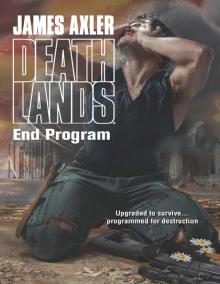 End Program
End Program Nemesis
Nemesis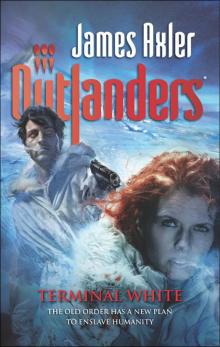 Terminal White
Terminal White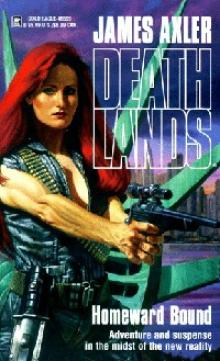 Homeward Bound d-5
Homeward Bound d-5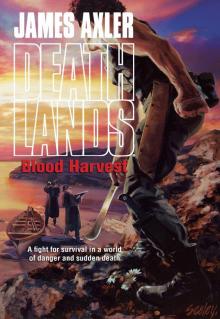 Blood Harvest (v5)
Blood Harvest (v5)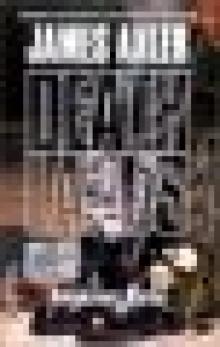 Amazon Gate
Amazon Gate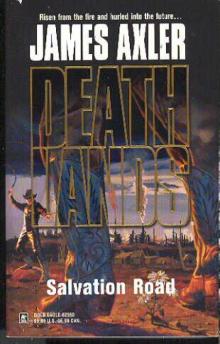 Salvation Road
Salvation Road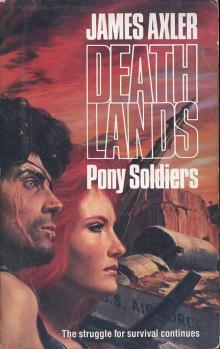 Pony Soldiers
Pony Soldiers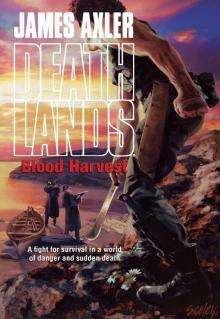 Blood Harvest
Blood Harvest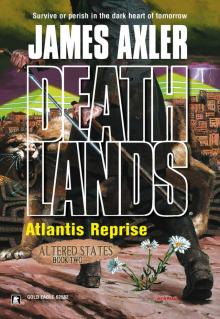 Atlantis Reprise
Atlantis Reprise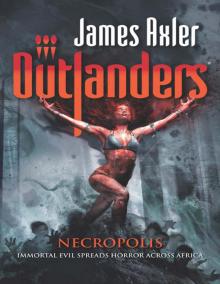 Necropolis
Necropolis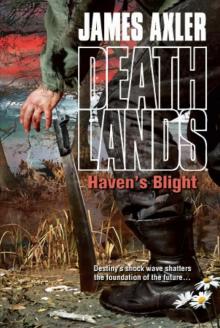 Haven's Blight
Haven's Blight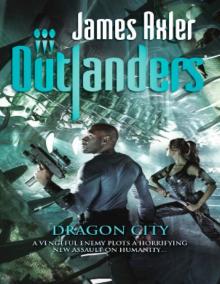 Dragon City
Dragon City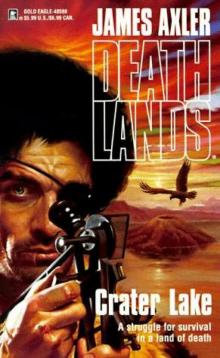 Crater Lake
Crater Lake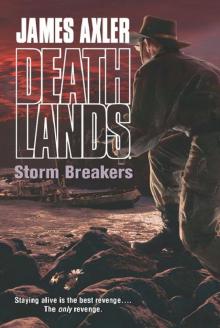 Storm Breakers
Storm Breakers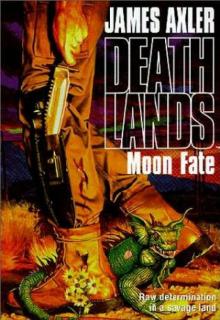 Moon Fate
Moon Fate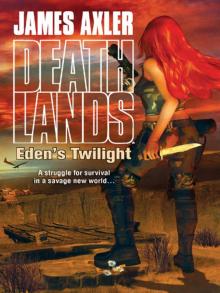 Eden’s Twilight
Eden’s Twilight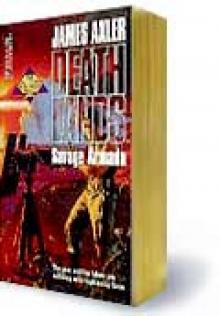 Savage Armada
Savage Armada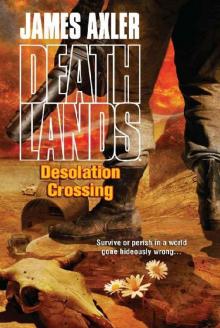 Desolation Crossing
Desolation Crossing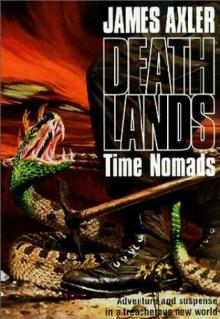 Time Nomads
Time Nomads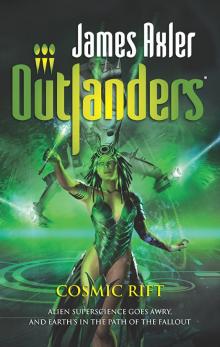 Cosmic Rift
Cosmic Rift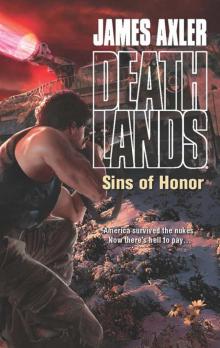 Sins of Honor
Sins of Honor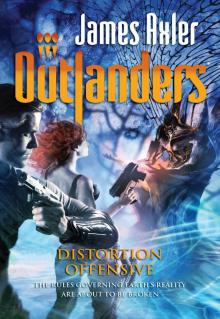 Distortion Offensive
Distortion Offensive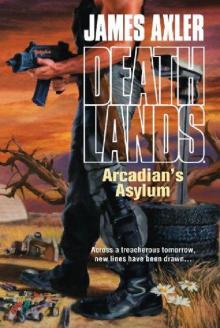 Arcadian's Asylum
Arcadian's Asylum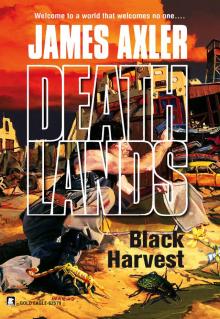 Black Harvest
Black Harvest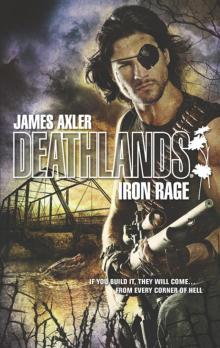 Iron Rage
Iron Rage Nightmare Passage
Nightmare Passage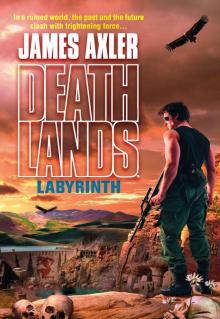 Labyrinth
Labyrinth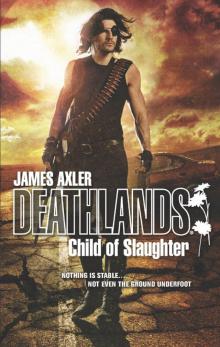 Child of Slaughter
Child of Slaughter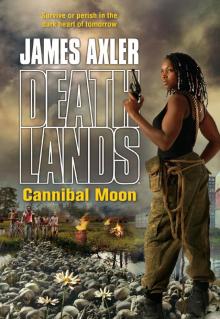 Cannibal Moon
Cannibal Moon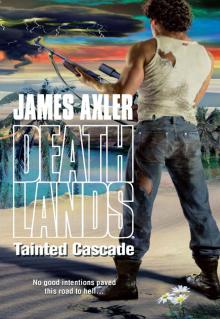 Tainted Cascade
Tainted Cascade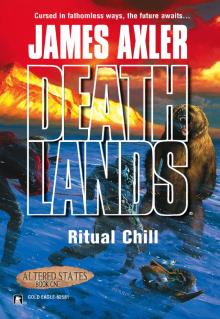 Ritual Chill
Ritual Chill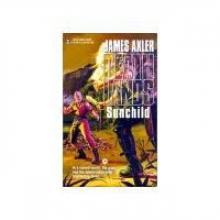 Sunchild
Sunchild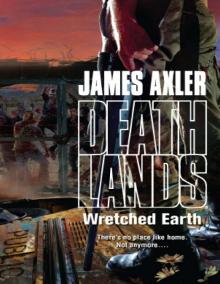 Wretched Earth
Wretched Earth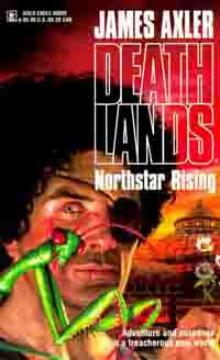 Northstar Rising d-10
Northstar Rising d-10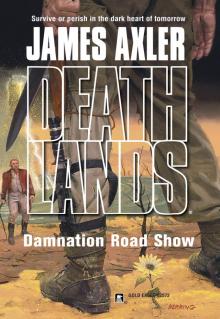 Damnation Road Show
Damnation Road Show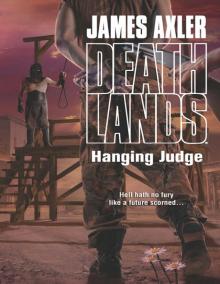 Hanging Judge
Hanging Judge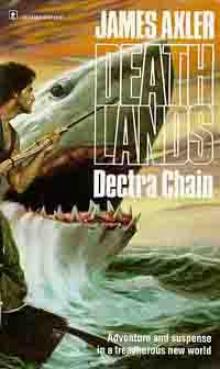 Dectra Chain d-7
Dectra Chain d-7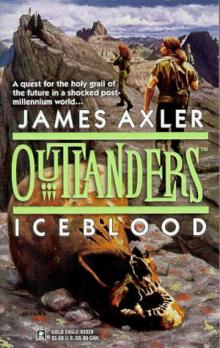 Iceblood
Iceblood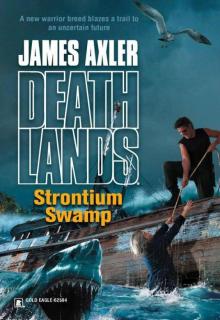 Deathlands 074: Strontium Swamp
Deathlands 074: Strontium Swamp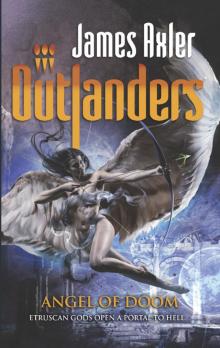 Angel of Doom
Angel of Doom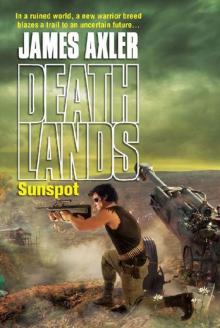 Sunspot
Sunspot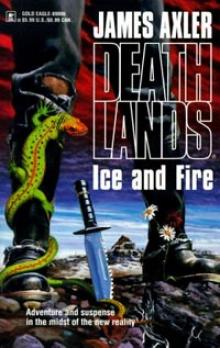 Ice and Fire d-8
Ice and Fire d-8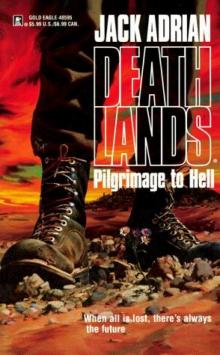 Pilgrimage to Hell d-1
Pilgrimage to Hell d-1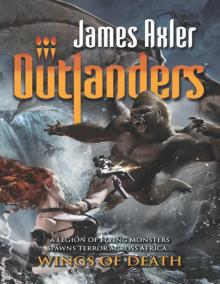 Wings of Death
Wings of Death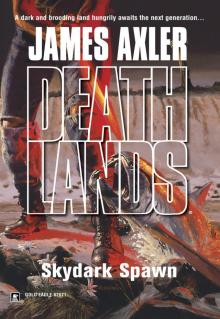 Skydark Spawn
Skydark Spawn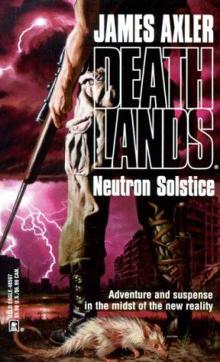 Neutron Solstice d-3
Neutron Solstice d-3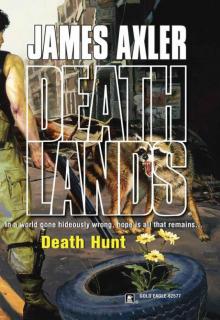 Deathlands 067: Death Hunt
Deathlands 067: Death Hunt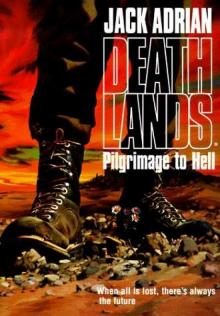 Pilgrimage to Hell
Pilgrimage to Hell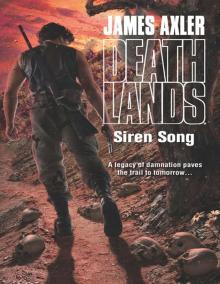 Siren Song
Siren Song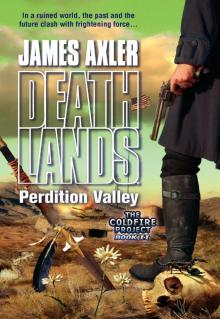 Perdition Valley
Perdition Valley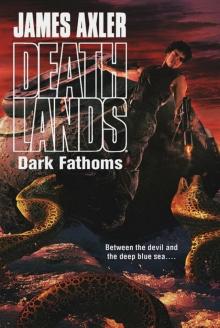 Dark Fathoms
Dark Fathoms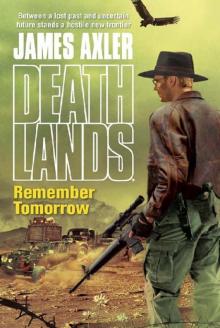 Remember Tomorrow
Remember Tomorrow Crucible of Time
Crucible of Time Savage Armada - Deathlands 53
Savage Armada - Deathlands 53 Judas Strike - Deathlands 54
Judas Strike - Deathlands 54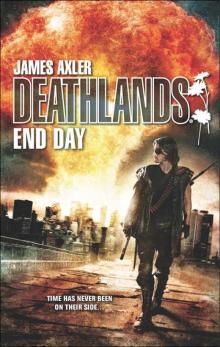 End Day
End Day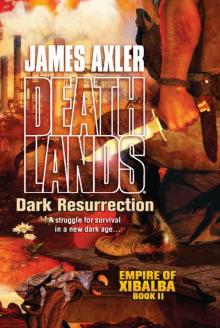 Dark Resurrection
Dark Resurrection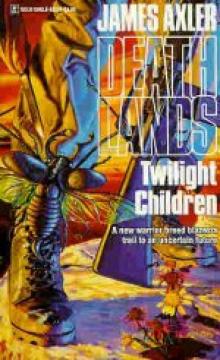 Deathlands - The Twilight Children
Deathlands - The Twilight Children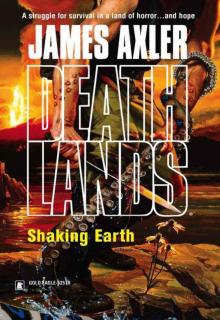 Deathlands 068: Shaking Earth
Deathlands 068: Shaking Earth Breakthrough
Breakthrough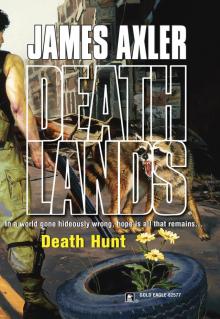 Death Hunt
Death Hunt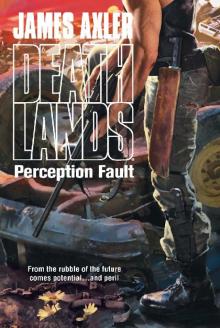 Perception Fault
Perception Fault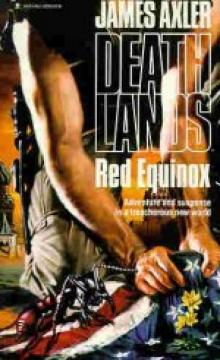 Red Equinox
Red Equinox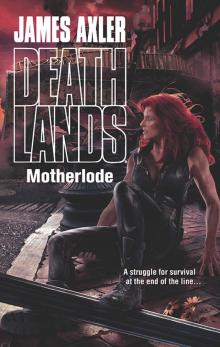 Motherlode
Motherlode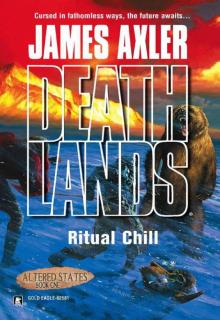 Deathlands 071: Ritual Chill
Deathlands 071: Ritual Chill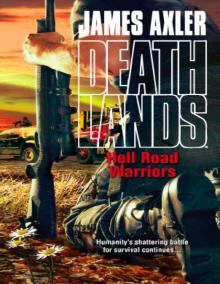 Hell Road Warriors
Hell Road Warriors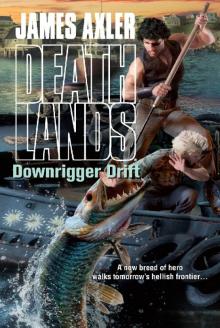 Downrigger Drift
Downrigger Drift Gaia's Demise
Gaia's Demise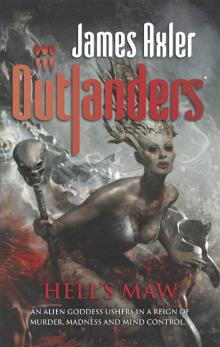 Hell's Maw
Hell's Maw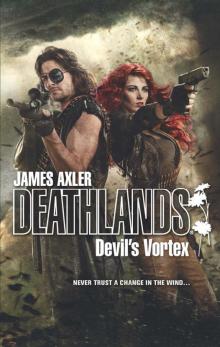 Devil's Vortex
Devil's Vortex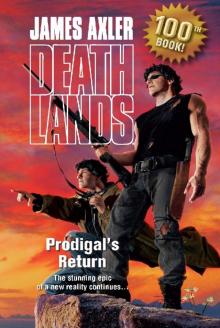 Prodigal's Return
Prodigal's Return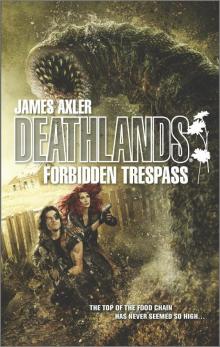 Deathlands 122: Forbidden Trespass
Deathlands 122: Forbidden Trespass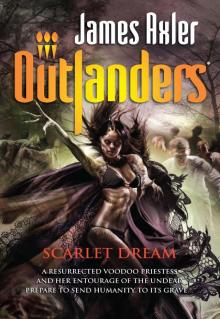 Scarlet Dream
Scarlet Dream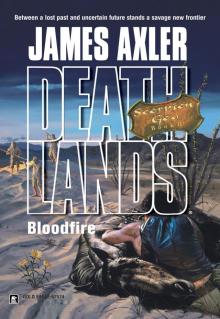 Bloodfire
Bloodfire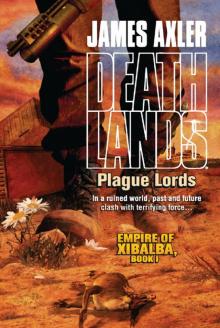 Plague Lords (Empire of Xibalba, #1)
Plague Lords (Empire of Xibalba, #1)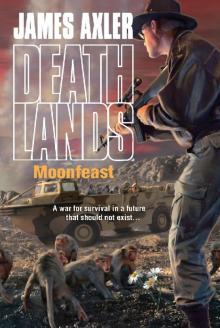 Moonfeast
Moonfeast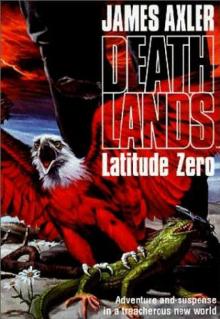 Latitude Zero
Latitude Zero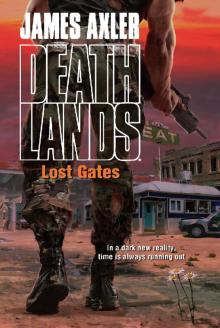 Lost Gates
Lost Gates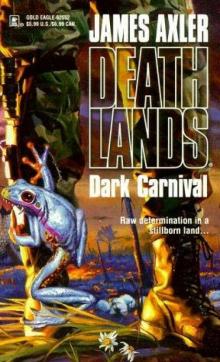 Dark Carnival
Dark Carnival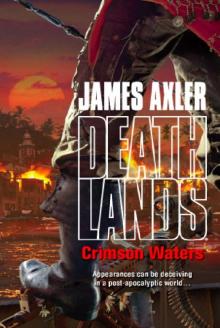 Crimson Waters
Crimson Waters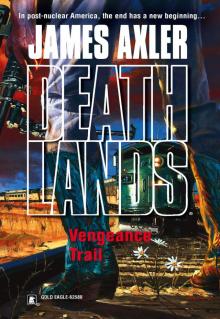 Vengeance Trail
Vengeance Trail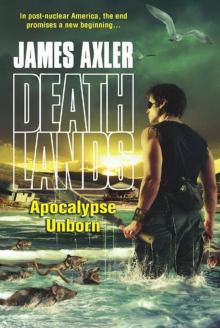 Apocalypse Unborn
Apocalypse Unborn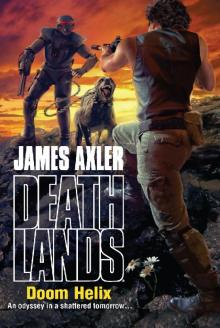 Doom Helix
Doom Helix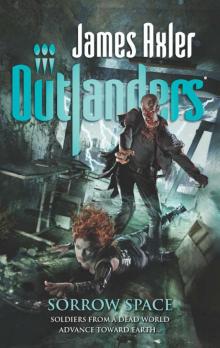 Sorrow Space
Sorrow Space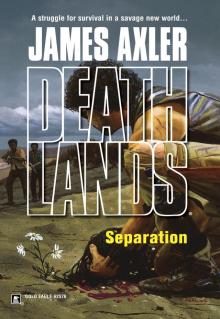 Separation
Separation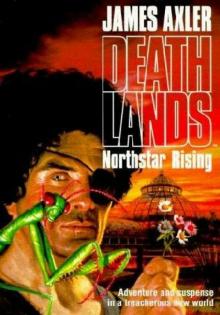 Northstar Rising
Northstar Rising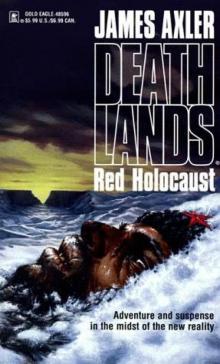 Red Holocaust
Red Holocaust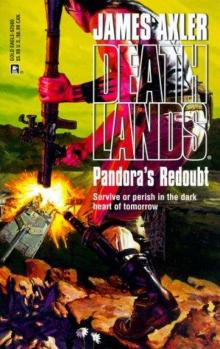 Pandora's Redoubt
Pandora's Redoubt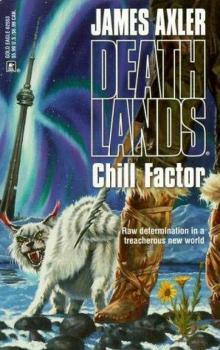 Chill Factor
Chill Factor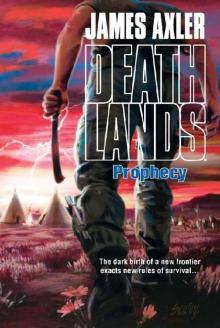 Prophecy
Prophecy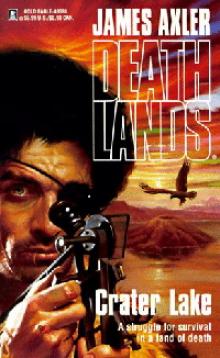 Crater Lake d-4
Crater Lake d-4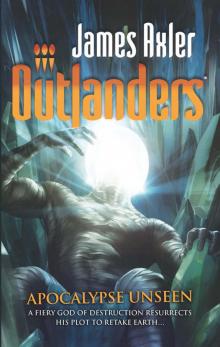 Apocalypse Unseen
Apocalypse Unseen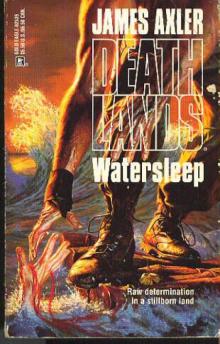 Watersleep
Watersleep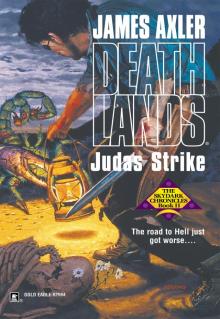 Judas Strike
Judas Strike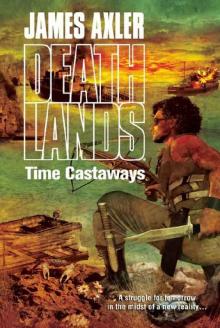 Time Castaways
Time Castaways Baptism of Rage
Baptism of Rage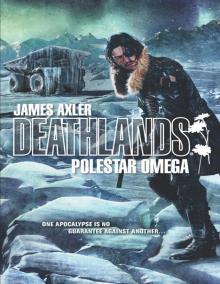 Polestar Omega
Polestar Omega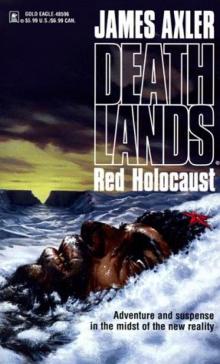 Red Holocaust d-2
Red Holocaust d-2 Outlanders 15 - Doom Dynasty
Outlanders 15 - Doom Dynasty Way of the Wolf
Way of the Wolf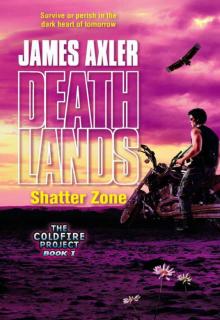 Deathlands 075: Shatter Zone
Deathlands 075: Shatter Zone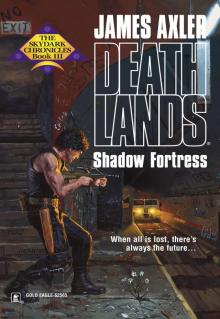 Shadow Fortress
Shadow Fortress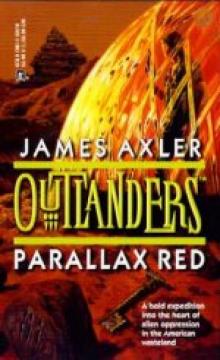 Outlander 05 - Parallax Red
Outlander 05 - Parallax Red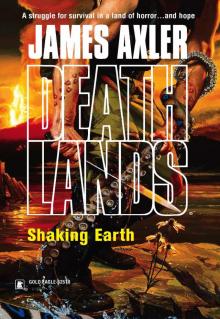 Shaking Earth
Shaking Earth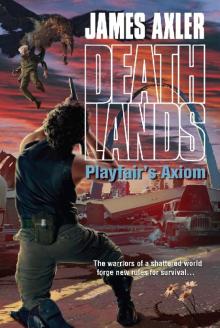 Playfair's Axiom
Playfair's Axiom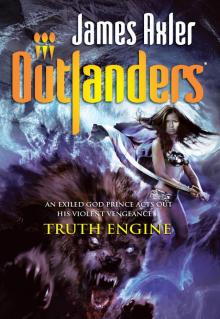 Truth Engine
Truth Engine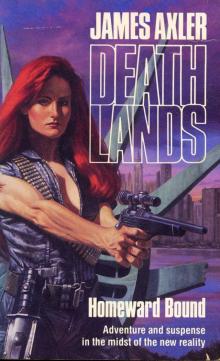 Homeward Bound
Homeward Bound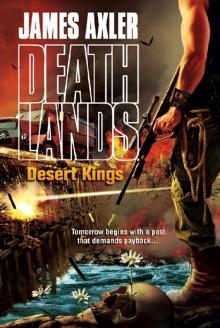 Desert Kings
Desert Kings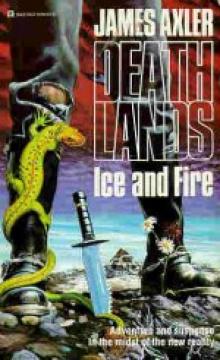 Ice and Fire
Ice and Fire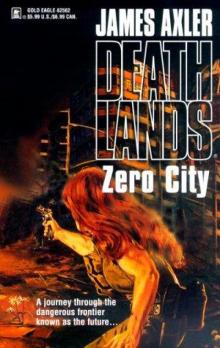 Zero City
Zero City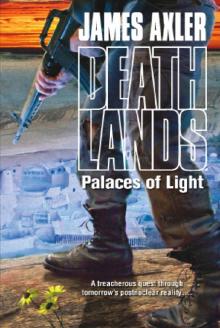 Palaces of Light
Palaces of Light No Man's Land
No Man's Land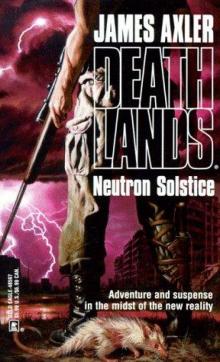 Neutron Solstice
Neutron Solstice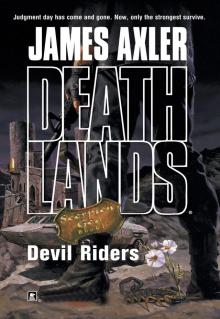 Devil Riders
Devil Riders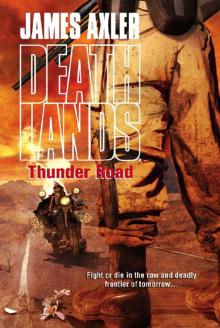 Thunder Road
Thunder Road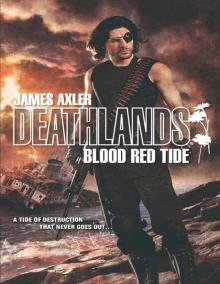 Deathlands 118: Blood Red Tide
Deathlands 118: Blood Red Tide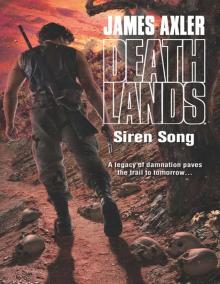 Deathlands 114: Siren Song
Deathlands 114: Siren Song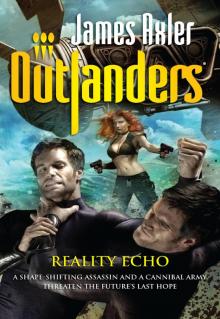 Reality Echo
Reality Echo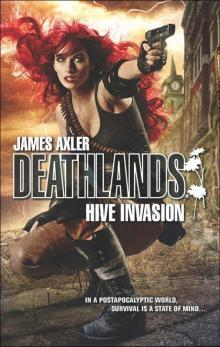 Hive Invasion
Hive Invasion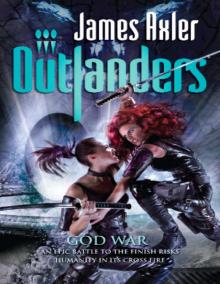 God War
God War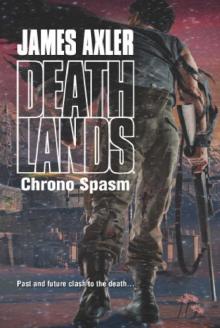 Chrono Spasm
Chrono Spasm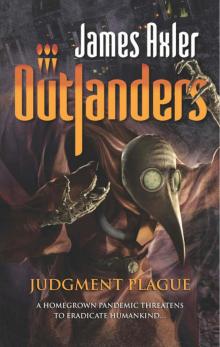 Judgment Plague
Judgment Plague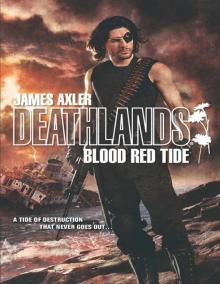 Blood Red Tide
Blood Red Tide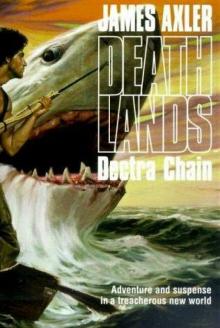 Dectra Chain
Dectra Chain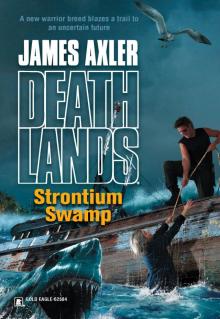 Strontium Swamp
Strontium Swamp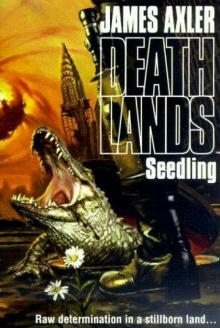 Seedling
Seedling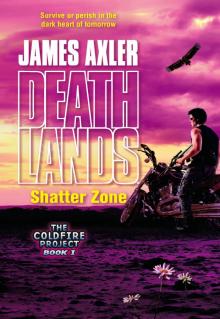 Shatter Zone
Shatter Zone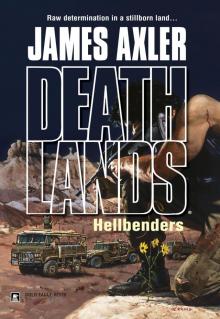 Hellbenders
Hellbenders